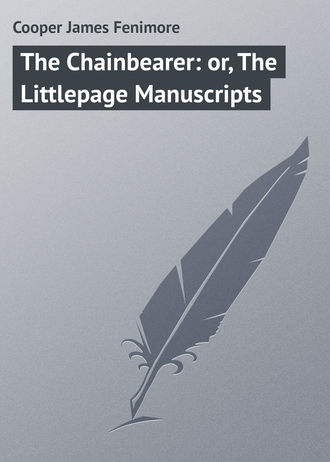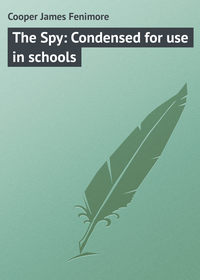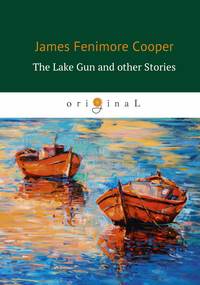 полная версия
полная версияThe Chainbearer: or, The Littlepage Manuscripts
My own reception by Miss Bayard was gracious, though I fancied it was not entirely free from the consciousness of having, on some idle occasion, heard her own name intimately connected with mine. Perhaps Kate, in their confidential moments, may have said something to this effect; or I may have been mistaken.
My grandmother soon announced that the whole party was to pass the night at Satanstoe. As we were accustomed to such plans, neither Kate nor myself raised the least objection, while the Bayards submitted to orders, which I soon discovered even they were not unused to, with perfect good will and submission. Thus brought together, in the familiarity of a quiet and small party in a country house, we made great progress in intimacy; and by the time dinner was over, or by four o'clock, I felt like an old acquaintance with those who had so lately been strangers to me, even by name. As for Bayard and my sister, they were in the best of humors from the start, and I felt satisfied their affair was a settled thing in their own minds; but Miss Priscilla was a little under constraint for an hour or two, like a person who felt a slight embarrassment. This wore off, however, and long before we left the table she had become entirely herself; and a very charming self it was, I was forced to admit. I say forced; for spite of all I had said, and a certain amount of good sense, I hope, it was impossible to get rid of the distrust which accompanied the notion that I was expected to fall in love with the young lady. My poor grandmother contributed her share, too, to keeping this feeling alive. The manner in which she looked from one to the other, and the satisfied smile that passed over her countenance whenever she observed Pris and myself conversing freely, betrayed to me completely that she was in the secret, and had a hand in what I chose to regard as a sort of plot.
I had heard that my grandmother had set her heart on the marriage of my parents a year or two before matters came round, and that she always fancied she had been very instrumental in forming a connection that had been as happy as her own. The recollection, or the fancy of this success most probably encouraged her to take a share in the present scheme; and I have always supposed that she got us all together on that occasion in order to help the great project along.
A walk on the Neck was proposed in the cool of the evening; for Satanstoe had many a pleasant path, pretty vista, and broad view. Away we went, then, the four of us, Kate leading the way, as the person most familiar with the "capabilities." We were soon on the shore of the Sound, and at a point where a firm, wide beach of sand had been left by the receding waters, rocks fringing the inner boundary toward the main. Here one could walk without confinement of any sort, there being room to go in pairs, or all abreast, as we might choose. Miss Bayard seeming a little coy, and manifesting a desire to keep near her friend, I abandoned the intention of walking at her side, but fell behind a little, and got into discourse with her brother. Nor was I sorry to have this early opportunity of sounding the party who was likely soon to become so nearly connected with me. After a few minutes, the conversation turned on the late revolution, and the manner in which it was likely to influence the future fortunes of the country. I knew that a portion of the family of my companion had adhered to the crown, losing their estates by the act of confiscation; but I also knew that a portion did not, and I was left to infer that Tom's branch belonged to the latter division of his name, inasmuch as his father was known to be very easy in his circumstances, if not absolutely rich. It was not long, however, before I ascertained that my new friend was a mild tory, and that he would have been better pleased had the rights we had sought, and which he was willing enough to admit had been violated, been secured without a separation of the two countries. As the Littlepages had actually been in arms against the crown, three generations of them, too, at the same time, and the fact could be no secret, I was pleased with the candor with which Tom Bayard expressed his opinions on these points; for it spoke well of the truth and general sincerity of his character.
"Does it not strike you as a necessary consequence of the distance between the two countries," I remarked in the course of the conversation, "that a separation must, sooner or later, have occurred? It is impossible that two countries should long have common rulers when they are divided by an ocean. Admitting that our separation has been a little premature, a circumstance I should deny in a particular discussion, it is an evil that every hour has a tendency to lessen."
"Separations in families are always painful, Major Littlepage; when accompanied by discussions, doubly so."
"Quite true; yet they always happen. If not in this generation, in the next."
"I do think," said Tom Bayard, looking at me a little imploringly, "that we might have got along with our difficulties without casting aside our allegiance to the king."
"Ay, that has been the stumbling-block with thousands; and yet it is, in truth, the very weakest part of the transatlantic side of the question. Of what avail is allegiance to the king, if parliament uses its power in a way to make American interests subservient to those of England? A great deal may be said, that is reasonable, in favor of kingly power; that I am ready enough to allow; but very little that renders one people subject to another. This thing called loyalty blinds men to facts, and substitutes a fancied for a real power. The question has been, whether England, by means of a parliament in which we have no representative, is to make laws for us or not; and not whether George III. is to be our sovereign, or whether we are to establish the sovereignty of the people."4
Bayard bowed, civilly enough, to my remark, and he changed the subject. Sufficient had been said, however, to satisfy me that there would be little political sympathy between us, let the family tie be drawn as close as it might. The girls joined us before we had got altogether into another vein of discourse, and I was a little chagrined at finding that Kate entered rather more into her admirer's views of such subjects than comported with the true feelings, as I fancied, of a Littlepage, after all that had passed. Still, as I should have liked the woman I loved to agree with me in opinion as much as possible in everything, I was not disposed to judge harshly of my sister on that account. On the other hand, to my surprise, I found Miss Priscilla a zealous, and, to say the truth, a somewhat blind patriot; condemning England, the king, and the efforts of parliament with a warmth that was only equal to that with which she defended everything, act, measure, principle, or policy, that was purely American.
I cannot say I had as much tolerance for the patriotism of Miss Bayard as I had for the petit treason of my sister. It seemed natural enough that Kate should begin to look at things of this nature with the eyes of the man she had made up her mind to marry; but it looked far more like management in her friend, who belonged to a tory family, to volunteer so freely the sentiments of one she could not yet love, inasmuch as until that day she had never even seen him.
"Is it not so, Major Littlepage?" cried this lovely creature, for very lovely she was, beyond all dispute; and feminine and delicate, and lady-like, and all I could have wished her, had she only been a little less of a whig, and a good deal more of a tory; her eyes sparkling and flashing, at the same time, as if she felt all she was saying from the very bottom of her heart – "Is it not so, Major Littlepage? – America has come out of this war with imperishable glory; and her history, a thousand years hence, will be the wonder and admiration of all who read it!"
"That will somewhat depend on what her history may prove to be, between that day and this. The early history of all great nations fills us with admiration and interest, while mightier deeds effected by an insignificant people are usually forgotten."
"Still, this revolution has been one of which any nation might have been proud!"
As it would not have been proper to deny this I bowed, and strayed a little from the rest of the party, under the pretence of looking for shells. My sister soon joined me, when the following short conversation passed between us.
"You find Pris Bayard a stanch whig, Major Littlepage," commenced my warm-hearted sister.
"Very much so; but I had supposed the Bayards excessively neutral, if not absolutely the other way."
"Oh! that is true enough of most of them, but not with Pris, who has long been a decided whig. There is Tom, now, rather moderate in his opinions, while the father and mother are what you call excessively neutral; but Pris has been a whig almost as long as I have known her."
"Almost as long! She was, then, a tory once?"
"Hardly; though certainly her opinions have undergone a very gradual change. We are both young, you will remember; and girls at their first coming out do very little of their own thinking. For the last three years, certainly, or since she was seventeen, Pris has been getting to be more and more of a whig, and less and less of a tory. Do you not find her decidedly handsome, Mordaunt?"
"Very decidedly so, and very winning in all that belongs to her sex – gentle, feminine, lady-like, lovely, and withal a whig."
"I knew you would admire her!" cried Kate, in triumph, "I shall live to see my dearest wish accomplished!"
"I make no doubt you will, child; though it will not be by the marriage of a Mr. Littlepage to a Miss Bayard."
I got a laugh and a blush for this sally, but no sign of submission. On the contrary, the positive girl shook her head, until her rich curls were all in motion, and she laughed none the less. We immediately joined our companions, and by one of those crossings over and figurings in, that are so familiar to the young of the two sexes, we were soon walking along the sands again, Tom at Kate's side, and I at that of Priscilla Bayard's. What the other two talked about I never knew, though I fancy one might guess; but the young lady with me pursued the subject of the revolution.
"You have probably been a little surprised, Major Littlepage," she commenced, "to hear me express myself so warmly in favor of this country, as some of the branches of my family have been treated harshly by the new government."
"You allude to the confiscations? I never justified them, and wish they had not been made; for they fall heaviest on those who were quite inoffensive, while most of our active enemies have escaped. Still it is no more than is usual in civil wars, and what would surely have befallen us, had it been our fortune to be the losing party."
"So I have been told; but, as no loss has fallen on any who are very near to me, my public virtue has been able to resist private feeling. My brother, as you may have seen, is less of an American than I am myself."
"I have supposed he is one of the 'extremely neutral;' and they, I have thought, always incline a little in favor of the losing party."
"I hope, however, his political bias, which is very honest, though very much in error, will not materially affect him in your good opinion. Too much depends on that, for me not to be anxious on the subject; and being the only decided whig in the family, I have thought I would venture to speak in behalf of a very dearly beloved brother."
"Well," I said to myself, "this is being sufficiently managing; but I am not quite so unpractised as to be the dupe of an artifice so little concealed! The deuce is in the girl; yet she seems in earnest, looks at me with the good faith and simplicity of a sister who feels even more than she expresses, and is certainly one of the loveliest creatures I ever laid eyes on! I must not let her see how much I am on my guard, but must meet management with management. It will be singular, indeed, if I, who have commanded a company of continentals with some credit, cannot get along with a girl of twenty, though she were even handsomer, and looked still more innocent than this Pris Bayard, which would be no easy matter, by the way."
The reader will understand this was what I said to myself, and it was soon uttered, for one talks surprisingly fast to himself; but that which I said to my fair companion, after a moment's hesitation, was very different in language and import.
"I do not understand in what way Mr. Bayard can be affected by my opinion, let it be for or against him," I answered, with just as much innocency of expression, according to my notion of the matter, as the young lady herself had thrown into her own pretty countenance, thereby doing myself infinite credit, in my own conceit; "though I am far from judging any man severely, because he happens to differ from me in his judgment of public things. The question was one of great delicacy, and the most honest men have differed the widest on its merits."
"You do not know how glad I am to hear you say this, Mr. Littlepage," returned my companion, with one of the sweetest smiles woman ever bestowed on man. "It will make Tom completely happy, for I know he has been sadly afraid of you, on this very point."
I did not answer instantly; for I believe I was watching the traces of that bewitching smile, and speculating against its influence with the pertinacity of a man who was determined not to be taken in. That smile haunted me for a week, and it was a long time before I fully comprehended it. I decided, however, to come to the point at once, as respects Bayard and my sister, and not be beating the bush with indirect allusions.
"In what manner can my opinion influence your brother, Miss Bayard?" I asked, as soon as I was ready to say anything. "To prevent misconceptions, let me beg of you to be a little more explicit."
"You can hardly be ignorant of my meaning, I should think!" answered Priscilla, with a little surprise. "One has only to look at the couple before us, to comprehend how your opinion of the gentleman might have an influence on himself, at least."
"The same might be said of us, Miss Bayard, so far as my inexperienced eye can tell. They are a young couple, walking together; the gentleman appearing to admire the lady, I will confess; and we are a young couple walking together, the gentleman appearing to admire the lady, or he does no credit to his taste or sensibility."
"There," said I to myself again, "that is giving her quite as good as I received; let me see how you take that."
Pris took it very well; laughing, and blushing just enough to make her appear the loveliest creature I had ever laid eyes on. She shook her head very much as my sister had done not long before, and disclaimed the analogy, first in her manner, and next with her tongue.
"The cases are very different, sir," she answered. "We are strangers to each other, while Tom Bayard and Kate Littlepage are acquaintances of years' standing. We do not love each other in the least; not a bit, though we are inclined to think very well of each other, on account of the interest we take in the couple before us, and because I am the intimate friend of your only sister, and because you are the only brother of my intimate friend. There, however," and she now spoke with emphasis, "our interest ceases, never to be increased beyond a friendly regard, that I trust will grow up out of our respective merits and respective discernment. It is very, very different with the couple before us;" here, again, the flexible girl spoke with extreme feeling; every tone and cadence of her voice denoting lively sensibility. "They have been long attached, not admirers of each other, as you call it, Major Littlepage, but attached; and your opinion of my brother just at this moment, is of the last importance to him. I hope I have at last made myself understood?"
"Perfectly; and I intend to be just as explicit. In the first place I enter a solemn protest against all that you have said about the 'other couple,' with the exception of the interest we each feel in the brother or sister. Next, I proclaim Kate Littlepage to be her own mistress, so far as her brother Mordaunt is concerned, and lastly, I announce that I see or know nothing in the character, connections, fortune, person, or position of her suitor, Thomas Bayard, of the Hickories, Esquire, that is in the least below her pretensions or merits. I hope that is sufficiently satisfactory?"
"Entirely so; and from the bottom of my heart I thank you for it. I will own I have had some little apprehensions on the subject of Tom's political opinions; but those removed, nothing else can remain to create the smallest uneasiness."
"How is it possible that any of you could consider my notions of so much importance, when Kate has a father, a mother, and a grandmother living, all of whom, as I understand things, approve of her choice?"
"Ah, Mr. Littlepage, you are not conscious of your importance in your own family, I see. I know it better than you appear to know it yourself. Father, mother, grandmother, and sister, all think and speak of Mordaunt alike. To hear the general converse of the war, you would suppose that he had commanded a company, and Captain Littlepage the regiment. Mr. Littlepage defers to Mordaunt's taste, and Mordaunt's opinions, and Mordaunt's judgment, even in housekeeping and hemstitching. Kate is forever saying, 'my brother says this,' 'my brother writes that,' 'my brother does t'other;' and as for the old lady here at the 'Toe,' she would hardly think her peaches and cherries could ripen, unless Mordaunt Littlepage, the son of her son Corny Littlepage – by no accident does she ever call him 'general,' – were on the face of the earth to create an eternal sunshine!"
Was there ever a girl like this! That speech was made too, in the quietest, most gentle, lady-like manner possible. That the young lady had spirit and humor enough, was very apparent; and for a moment I doubted whether both were not accompanied by the most perfect simplicity of character, and the most perfect good faith. Subsequent remarks and occurrences, however, soon revived all my original distrusts.
"This is a vivid picture of family weaknesses, that you have so graphically drawn, Miss Bayard," I answered; "and I shall not easily forget it. What renders it the more lively and pointed, and the more likely to be relished by the world, is the fact that Mordaunt so little deserves the extreme partiality of the friends you have mentioned."
"The last feature forms no part of my picture, Major Littlepage, and I disown it. As for the world, it will never know anything about it. You and I are not the world, nor are we at all likely ever to be the world to each other; I wish you particularly to understand that, which is the reason I am so frank with you on so short an acquaintance. I tell you your opinion is of the last importance to Tom; as your sister would not marry him, did she believe you thought in the least ill of him."
"And she would, did I think well of him?"
"That is a question a lady must answer for herself. And now we will say no more on the subject; for my mind is easy since I find you entertain no political hostility to Tom."
"Men are much less apt to entertain such feelings, I fancy, after they have fairly fought out a quarrel, than when they only talk over its heads. Besides, the winning party is commonly the least rancorous, and success will make us whigs forgiving. I give you my honor, no objection will be raised against your brother, by me, on account of his opinions of the revolution. My dear mother herself has been half a tory the whole war; and Kate, I find, has imbibed all her charity."
A singular, and, as I found, a painful smile, crossed the sweet face of Priscilla Bayard, as I made this remark; but she did not answer it. It seemed to me she was now desirous of quitting the subject entirely, and I immediately led the discourse to other things.
Kate and I remained at Satanstoe several days, and Tom Bayard was a daily visitor; the distance between the Neck and the Hickories being no great matter. I saw the young lady twice during the interval; once, by riding over to her father's residence with that express object; and once when she came across on horseback to see her friend. I confess I was never more at a loss to understand a character than I was that of this young woman. She was either profoundly managing, or as innocent and simple as a child. It was easy to see that her brother, my sister, my grandmother, and, as I fancied, the parents of the young lady herself, were anxious that I should be on as good terms as possible with Pris, as they all called her; though I could not fathom her own feelings on the subject. It would have been unnatural not to have loved to gaze on her exceeding beauty, or not to have admired her extremely graceful and feminine manner, which was precisely all that one could wish it to be in the way of ease and self-possession, without being in the least free or forward; and I did gaze on the one, and admire the other, at the very moment I was most disposed to distrust her sincerity, and to believe her nature the very perfection of art. There were times when I was disposed to fancy this Pris Bayard as profound and skilful an actor as one of her sex, years, and condition in life could well become, without falling altogether; and there were moments, too, when she seemed to be instinct with all the sensitive and best qualities of her sex.
It is scarcely necessary to say I remained heart-whole, under such circumstances, notwithstanding the obvious wishes of my friends, and the young lady's great advantages! A man no more falls blindly in love when he distrusts anything amiss, than he sees anything amiss when he is blindly in love. It has often been a matter of surprise to me, how often and how completely the wisest of the earthly races conspire to deceive themselves. When suspicions are once excited, testimony is not needed; condemnation following much as a logical induction, though founded on nothing better than plausible distrusts; while, on the other hand, where confidence exists, testimony is only too apt to be disregarded. Women, in particular, are peculiarly apt to follow the bias of their affections, rather than of their reasons, in all cases connected with guilt. They are hard to be convinced of the unworthiness of those who belong to them through the affections, because the affections are usually stronger with them than their reasoning powers. How they cling to their priests, for instance, when the cooler heads and greater experience of men condemn, and that merely because their imaginations choose to adorn the offenders with the graces of that religion which they venerate, and on which they rely? He is a shrewd man who can draw the line between the real and the false in these matters; but he is truly a weak one who disregards evidence, when evidence is complete and clear. That we all have our sins and our failings is true, but there are certain marks of unworthiness which are infallible, and which ought never to be disregarded, since they denote the existence of the want of principle that taints a whole character.
CHAPTER V
"He were an excellent man that were made just in the midway between him and Benedick; the one is too like an image, and says nothing; and the other, too like my lady's eldest son, evermore tattling." —Beatrice.
The very day my sister and I left Satanstoe, there was an interesting interview between my grandmother and myself, that it may be well to relate. It took place in the cool of the morning, before breakfast, indeed, and previously to the appearance of any of the rest of the party; for Tom Bayard and his sister had again ridden across the country to pass the night and see us off. My grandmother had requested me to meet her thus early, in a sort of little piazza, that modern improvements had annexed to one end of the old buildings, and in which we both appeared accordingly with the utmost punctuality. I saw by a certain sort of importance that my good grandmother wore in her countenance, that she had weighty matters on her mind, and took the chair she had set for me with some little curiosity to learn what was to follow. The chairs were placed side by side, or nearly so, but looking different ways, and so close together that, when seated, we were quite face to face. My grandmother had on her spectacles, and she gazed wistfully through them at me, parting the curls on my forehead, as had been her wont when I was a boy. I saw tears rolling out from behind the glasses, and felt apprehensive I might have said or done something to have wounded the spirit of that excellent and indulgent parent.









